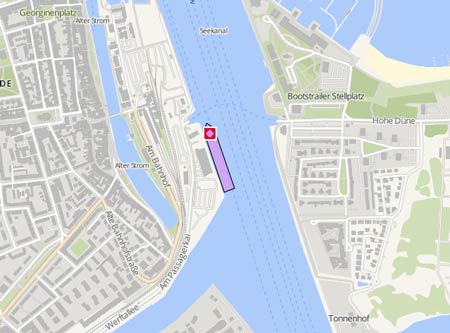ALASKABORG
Kurs/Position
Die letzten Häfen
Die letzten Wegpunkte
Die neuesten Nachrichten
Report: Oil was accidently pumped over board
The captain of the 'Alaskaborg' was seriously negligent when the ship lost oil off the Canadian coast on Feb 9, 2022, according to the Maritime Disciplinary Board in Amsterdam. Without the crew noticing, the ship pumped fuel oil overboard for 12 hours. The ship had departed from Canada towards Rotterdam on Feb 7. Two days after departure, the bilge alarm went off at 6:30 p.m. in the bilge well of hold two on the port side. The ship was sailing south of Newfoundland at the time. It was thought that snow may have gotten into the hold, which then started to melt, or that water got in, because the ship was in bad weather. In both cases, a logical solution seemed to be to pump the excess water in the hold overboard. Because the ship was in stormy weather, it was rolling and pitching, and the captain judged that it was too dangerous to allow crew members to enter the hold for inspections at that time. The ship was loaded and it was not safe to walk around the hold. It was agreed to keep the pump that had now been added at the bilge well in question and to keep it going, until the weather improved. The next morning at 8 a.m. the weather conditions were better, and crew members went into the hold. There they discovered a hole in a fuel tank, from which oil was leaking into the hold. The oil mixed with the cargo, but also entered the bilge and turned out to be the cause of the alarm. And so it was not melted snow or spray water that had been pumped overboard in the previous 12 hours, but oil. Snowed hard However, the Disciplinary Board does not blame the captain and the hwtk for assuming that it was excess water. 'When loading into hold 2 it snowed harder than when loading into the other holds and the fuel tank was heated there. Water ingress had happened before. Under these circumstances, the person concerned, given his knowledge at the time of the accident, should not have considered another cause," the Disciplinary Board wrote. Also read: The person on board can also submit a complaint to the Maritime Disciplinary Board What also speaks for the crew is that the way in which the hole in the tank occurred rarely or never occurs. The lashings of a tween deck hatch had broken loose and as a result crashed against the wall of the fuel tank. “Those involved had never experienced this before and it almost never happens,” the Disciplinary Board writes. However, such a leak should also be visible on one of the screens on the bridge, the council thinks. But it also acknowledges that the sensor information may have been unreliable during the current weather conditions, with significant shaking on the ship. The captain's defense: 'They can show both +50 and -50 cubic meters. That's why we didn't think about that.' Permanent alarm Where the captain and the hwtk seriously failed was in their actions in the hours after the first alarm. The Disciplinary Board about the actions of the captain: 'The person concerned was initially entitled to think that melt water or ingress of water was the cause of the alarm going off. But when the alarm kept going off, he should have been aware that something else was going on. Precisely because only one of the bilge wells continued to give an alarm. Since the severe weather conditions initially did not allow checking why the alarm went off, the person concerned should have given the order to pump into the ballast tank instead of overboard. Even though there was no official procedure for this.' This is also the lesson that the Disciplinary Board draws from the incident: if it is not clear what is leaking, the liquid should not be pumped overboard, but should be stored for safety reasons in one of the ship's ballast tanks (if that is possible). How much has been leaked? What is unclear is how much oil was actually pumped overboard in those 12 hours. The Canadian Coast Guard estimated it at 30,000 liters of oil. 'No one can answer the question exactly how much oil has entered the ocean. It could well be that it only concerns one hundred thousand," says the hwtk. A member of the Disciplinary Board dares to make an estimate
Fire in cargo hold
The 'Alaskaborg' with 12 crew members on board suffered a fire in its cargo hold No.2, in position 40 25 02N, 053 33 09W, about 510 nautical miles eastsoutheast of Halifax, Nova Scotia, on June 27, 2021, around 10 a.m. The crew was able to extinguish the fire, and the vessel resumed its voyage to Trois-Rivieres, Quebec, where it arrived on July 3.
News schreiben

